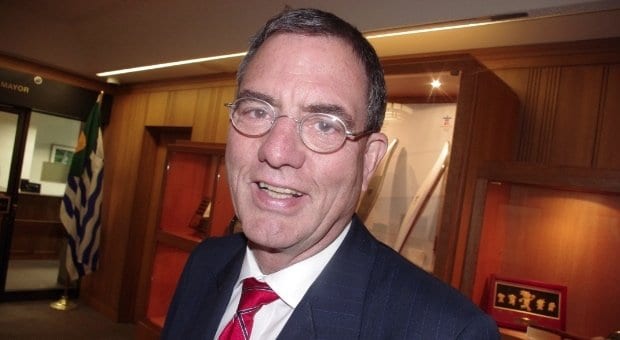Councillor Tim Stevenson wants Vancouver city council to pass a motion urging the International Olympic Committee (IOC) to amend its charter to explicitly prohibit discrimination on the basis of sexual orientation during the Sochi 2014 Winter Games and all future Olympics.
Stevenson announced his intention to introduce the motion — which he says Mayor Gregor Robertson plans to second — on Dec 10.
He plans to present his motion to council on Dec 17.
The IOC charter currently states that “the practice of sport is a human right” and that “any form of discrimination with regard to a country or a person on grounds of religion, politics, gender or otherwise is incompatible with belonging to the Olympic Movement.”
Stevenson says “sexual orientation” may be included in the “otherwise” category, but he would much rather see it explicitly named and protected.
He holds up the International Paralympic Committee charter, which explicitly forbids discrimination on the ground of sexual orientation, as a “model for what the IOC should have.”
If Stevenson’s motion passes, the City of Vancouver will also petition the IOC to ensure the protection of all LGBT athletes, coaches, officials, spectators and their allies in Sochi during the Winter Games in February.
“We have to make sure that there is protection for all of those [gay athletes and supporters] that go to Sochi,” he says.
Stevenson would also like the IOC to direct all future host cities to facilitate and endorse the creation of a community-led Pride House as part of their bid. Community organizers launched the first Pride House here in Vancouver and Whistler at the 2010 Winter Games.
If Stevenson’s motion passes, he will represent the City of Vancouver as deputy mayor at the Sochi Olympics and advocate to IOC officials there on behalf of his city council colleagues.
Although Vancouver hosted the last Winter Games in 2010, Stevenson says city council has no authority regarding the Sochi Games or future Olympics. “We have no role in the Olympics at all,” he says. “All we are is a past host city.”
But as a past host city and creator of the first Pride House for LGBT athletes, Vancouver is in a perfect position to encourage the IOC to amend its charter for greater visibility and equality, Stevenson maintains.
Following Vancouver and Whistler’s lead, the London 2012 Olympic and Paralympic Games also hosted a Pride House.
Stevenson says Vancouver has also spoken with organizers in Brazil about how they can foster queer visibility at the 2016 Summer Games in Rio.
“I don’t think things will change in Sochi,” Stevenson says, pointing to Russia’s anti-gay legislation. “But we want to ensure that there are safe places [for gay athletes] in every Olympics from here on in. We want to make sure that future countries have Pride Houses and that we don’t have a situation like we do in Russia.”
Russia has come under international scrutiny since President Vladimir Putin signed a “gay propaganda” law in June, prohibiting the distribution of any information or imagery that could encourage children to consider engaging in “non-traditional sexual relations.”
In August, Putin signed another decree banning all demonstrations and rallies in Sochi between January and March to thwart protests by gay rights activists (and others) during the Games.
Jean-Claude Killy, chair of the IOC coordination commission, said in September that the IOC doesn’t have the authority to intervene in Russia’s laws. He also said he is confident there will be no discrimination against athletes or spectators in Sochi.
According to media reports, Killy said the IOC is convinced that Russia will respect the Olympic charter, which prohibits discrimination of any kind.
Russian officials have said their anti-gay-propaganda law is designed to protect children and doesn’t infringe on the rights of gay people.
Stevenson disagrees.
“I’m not really concerned about what their rationale is,” he says. “We know that they won’t have a Pride House in Sochi, and what children are protected under that rationale?”
Stevenson says the idea for this motion came to him after witnessing the global Russian vodka boycott this summer. “I thought, ‘What more could we do?’ Personally, this is very important to me.”
“Obviously, one is apprehensive,” he says, asked if he has safety concerns about travelling to Sochi as a gay man. “But I really feel it is absolutely crucial that we stand up.”
If city council approves Stevenson’s motion on Dec 17, he will accompany Maureen Douglas, former community relations advisor for the Vancouver Olympic Committee, and Dean Nelson, executive director of Whistler’s 2010 Pride House, to Sochi in February.
The Host City Pride House mission to Sochi will be privately funded by individual contributors, rather than municipal tax dollars.
To sign a petition in support of the mission to Sochi or to donate, click here.

 Why you can trust Xtra
Why you can trust Xtra


